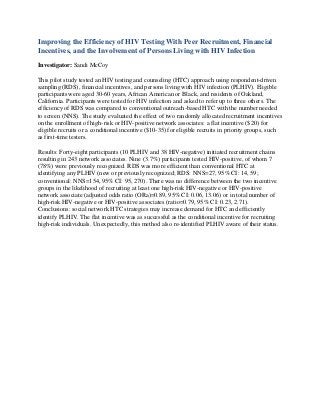
Improving the efficiency of hiv testing with peer recruitment
- 1. Improving the Efficiency of HIV Testing With Peer Recruitment, Financial Incentives, and the Involvement of Persons Living with HIV Infection Investigator: Sandi McCoy This pilot study tested an HIV testing and counseling (HTC) approach using respondent-driven sampling (RDS), financial incentives, and persons living with HIV infection (PLHIV). Eligible participants were aged 30-60 years, African American or Black, and residents of Oakland, California. Participants were tested for HIV infection and asked to refer up to three others. The efficiency of RDS was compared to conventional outreach-based HTC with the number needed to screen (NNS). The study evaluated the effect of two randomly allocated recruitment incentives on the enrollment of high-risk or HIV-positive network associates: a flat incentive ($20) for eligible recruits or a conditional incentive ($10-35) for eligible recruits in priority groups, such as first-time testers. Results: Forty-eight participants (10 PLHIV and 38 HIV-negative) initiated recruitment chains resulting in 243 network associates. Nine (3.7%) participants tested HIV-positive, of whom 7 (78%) were previously recognized. RDS was more efficient than conventional HTC at identifying any PLHIV (new or previously recognized; RDS: NNS=27, 95% CI: 14, 59; conventional: NNS=154, 95% CI: 95, 270). There was no difference between the two incentive groups in the likelihood of recruiting at least one high-risk HIV-negative or HIV-positive network associate (adjusted odds ratio (ORa)=0.89, 95% CI: 0.06, 13.06) or in total number of high-risk HIV-negative or HIV-positive associates (ratio=0.79, 95% CI: 0.23, 2.71). Conclusions: social network HTC strategies may increase demand for HTC and efficiently identify PLHIV. The flat incentive was as successful as the conditional incentive for recruiting high-risk individuals. Unexpectedly, this method also re-identified PLHIV aware of their status.